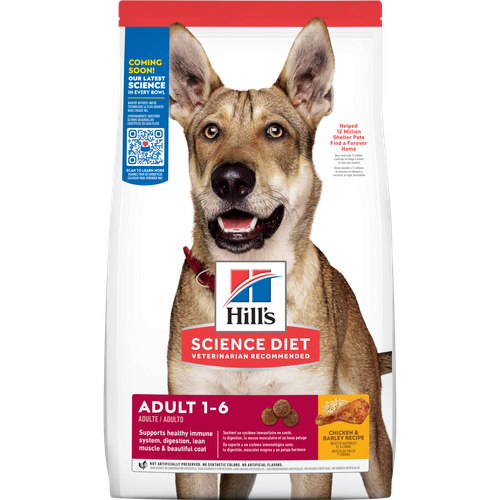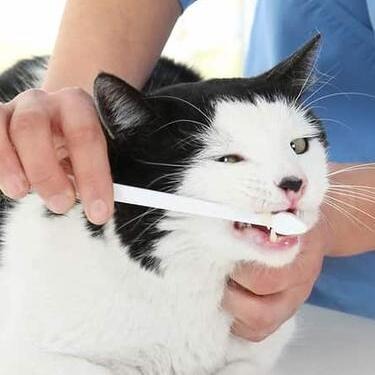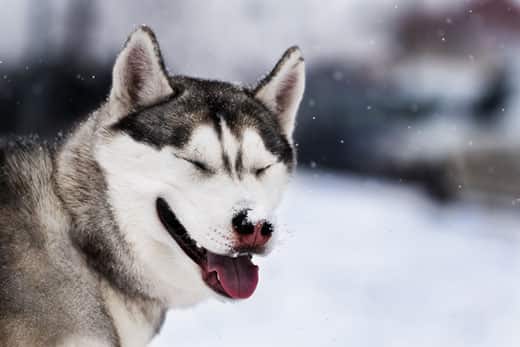
-
Find the right food for your petTake this quiz to see which food may be the best for your furry friend.Find the right food for your petTake this quiz to see which food may be the best for your furry friend.Featured products
 Adult Chicken & Barley Recipe Dog Food
Adult Chicken & Barley Recipe Dog FoodSupports lean muscle and beautiful coat for adult dogs
Shop Now Puppy Lamb Meal & Brown Rice Recipe
Puppy Lamb Meal & Brown Rice RecipeVital nutrients to support 5 essential building blocks for lifelong health
Shop Now Adult Small & Mini Lamb Meal & Brown Rice Recipe Dog Food
Adult Small & Mini Lamb Meal & Brown Rice Recipe Dog FoodFor the faster metabolism of Small & Mini dogs
Shop NowFeatured products Hill's Science Diet Adult Sensitive Stomach & Skin Chicken Recipe Dog Food
Hill's Science Diet Adult Sensitive Stomach & Skin Chicken Recipe Dog FoodHighly digestible recipe, gentle on stomachs. Nourishes skin & promotes a lustrous coat
Shop Now Adult Chicken & Barley Recipe Dog Food
Adult Chicken & Barley Recipe Dog FoodSupports lean muscle and beautiful coat for adult dogs
Shop Now Adult Indoor Chicken Recipe Cat Food
Adult Indoor Chicken Recipe Cat FoodSupports energy level and beautiful fur in indoor cats
Shop Now -
Dog
- Dog Tips & Articles
-
Health Category
- Weight
- Food & Environmental Sensitivities
- Urinary
- Digestive
- Joint
- Kidney
-
Life Stage
- Puppy Nutrition
- Adult Nutrition
- Senior Nutrition
Cat- Cat Tips & Articles
-
Health Category
- Weight
- Skin & Food Sensitivities
- Urinary
- Digestive
- Kidney
-
Life Stage
- Kitten Nutrition
- Adult Nutrition
Featured articles Virtual Vet Visits: What You Need to Know
Virtual Vet Visits: What You Need to KnowLearn the ins and outs of a televet appointment before you talk to a vet online.
Read More Pet Dental Health: What Happens During a Deep Teeth Cleaning?
Pet Dental Health: What Happens During a Deep Teeth Cleaning?Learn about veterinary dental care for your pet, including deep teeth cleaning procedures, which can help your dog or cat maintain proper dental health.
Read More My Pet Ate a Lizard — What Should I Do?
My Pet Ate a Lizard — What Should I Do?Learn what to do if your pet eats a lizard, including whether they can be toxic and symptoms to keep an eye on when they've swallowed one.
Read More -


Do you have a dog whose nose turns pink as the weather outside gets colder? If so, your dog might have what is commonly referred to as snow nose. But cold weather isn't the only reason some dogs' noses turn pale. Want to know why dogs' noses turn pink, and whether it is something you should worry about? Here's what you need to know.
What Is Snow Nose?

Snow nose is a common term for a dog nose that's loses pigment and turns from black/brown to pink. Typically, this either appears as spots or as a stripe down the center of the nose, says Life In the Dog Lane.
Dogs are more likely to get snow nose during the winter or in cold climates. However, snow nose isn't limited to dogs in northern climates, as was once believed. It's usually temporary, with pigment returning to normal once the weather warms up. But as dogs get older, their snow noses sometimes stick around all year.
While snow nose doesn't seem to be restricted to certain types of dogs, some breeds are more likely to get it than others. Snow nose most commonly occurs among Siberian huskies, Labrador retrievers, golden retrievers and Bernese mountain dogs — all breeds that are originally from northern climates.
Why Do Dogs' Noses Turn Pink?
No one knows for sure what causes snow nose. One possible explanation is that it's caused by the breakdown of tyrosinase, the enzyme that produces melanin, or skin pigment, says Cuteness. Tyrosinase is sensitive to cold temperatures and also tends to break down with age. This fails to explain, however, why snow nose only occurs in some dogs and why it can also affect dogs in warmer climates. The answers to these questions remain a mystery.


Tasty Tips
Should You Worry If Your Dog Gets Snow Nose?
Snow nose doesn't need to be treated by a doctor any more than gray hair in humans needs to be. And there's no way to restore lost pigment to your dog's nose. That said, melanin helps protect your dog's tender nose from sun damage. Without this natural protection, you'll need to limit your dog's sun exposure or apply a dog-friendly sunscreen to their nose before they go into the sun.
And while the exact cause of snow nose is unknown, some veterinarians recommend having your dog's thyroid checked out in order to rule out a thyroid issue as a possible cause, says The Spruce Pets. Some vets also believe that loss of pigment could be a reaction to chemicals leaching from plastic food or water dishes. To be on the safe side, switch your dog's bowls to metal or ceramic if they aren't already. And it's always a good idea to report any sudden changes in the appearance of your dog's nose to your vet.
Snow nose is a fairly common occurrence and usually not cause for concern. Once any health issues are ruled out, you can rest easy knowing there's nothing wrong with your pet — even if their newly pink nose might take some getting used to.


Jean Marie Bauhaus is a pet parent, pet blogger, and novelist from Tulsa, Oklahoma, where she usually writes under the supervision of a lapful of fur babies.
Related products

For the faster metabolism of Small & Mini dogs

Vital nutrients to support 5 essential building blocks for lifelong health

Supports lean muscle and beautiful coat for adult dogs

Supports energy level and beautiful coat in mature dogs who prefer smaller kibble
Related articles

Proper nutrition for your pregnant or nursing dog is vital to her and her puppy's health. Learn what you should do provide her with the proper nutrients.

Learn about Hill's puppy food and the nutritional benefit & high quality ingredients that it contains for your pup.

Discover how the field of dog science is giving us more and more insights into the inner workings of our furry best friends.

Your dog's coat and skin are a big part of your dog's overall health. Ensure you keep your dog's coat healthy, by following these simple tips.

Put your dog on a diet without them knowing
Our low calorie formula helps you control your dog's weight. It's packed with high-quality protein for building lean muscles, and made with purposeful ingredients for a flavorful, nutritious meal. Clinically proven antioxidants, Vitamin C+E, help promote a healthy immune system.
Put your dog on a diet without them knowing
Our low calorie formula helps you control your dog's weight. It's packed with high-quality protein for building lean muscles, and made with purposeful ingredients for a flavorful, nutritious meal. Clinically proven antioxidants, Vitamin C+E, help promote a healthy immune system.

